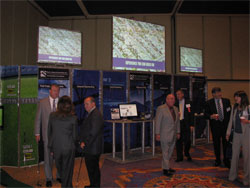2011 West Coast Casualty Construction Defect Seminar – Recap
June 01, 2011 —
CDJ STAFF �  | �
�| Event exhibitors and sponsors contribute to an informative and engaging environment | �
�This year’s meeting was the best yet for the industry-leading construction defect and claims event.
�This year’s seminar concluded on May 13, 2011 with the Construction Defect Community Charitable Foundation Golf Tournament, held at Strawberry Farms Golf Course.
�The Disneyland Hotel in Anaheim, California was the place where more than 1,500 attendees convened for two days of professional development activities and seminars that included CLE workshops and panel discussions of special interest to legal and insurance professionals concerned with construction defect and claims litigation. Key events included “Challenges for Experts in Construction Defect Claims and Litigation,” “Keeping Up with Construction Defect Coverage,” and “Tips for Avoiding the ‘Perfect Storm’ in Handling of Wrap Claims.”
� �  | �
�| Supporting the golf tournament at the 15th hole | �
�This year’s Ollie award was given to George D. Calkins II, Esq. The West Coast Casualty Jerrold S. Oliver Award of Excellence was named in honor of the late Judge Jerrold S. Oliver, and recognizes an individual who is outstanding or has contributed to the betterment of the construction community.
�In addition to being the most comprehensive professional development seminar in the area of construction defects, this year’s seminar was equally valuable as a networking opportunity for members of the industry. People participated in professional development events during the day and then continued networking in the evening at numerous social events. The Lawn Party as well as the legendary Wood, Smith, Henning & Berman events were very well attended. Additional valuable networking events were hosted by a number of industry professionals at the House of Blues, and Tortilla Joe’s.
�As of this writing the 2011, West Coast Casualty's Construction Defect Seminar has applied for or has already received the following continuing education accreditation in the following areas;
�Read the full story…
�For more information about next year’s event, visit West Coast Casualty.
Read the court decisionRead the full story...Reprinted courtesy of
Colorado Governor Polis’s Executive Order D 2020 101: Keeping Up with Colorado’s Shifting Eviction Landscape during COVID-19
July 27, 2020 —
Luke Mecklenburg - Snell & Wilmer Real Estate Litigation BlogOn March 5, 2020, Colorado Governor Polis issues executive order D 2020 012, which among other things imposed temporary limitations on evictions, foreclosures, and public utility disconnections. After being amended and extended three times (through April 30, 2020 via D 2020-0131, then for an additional 30 days via D 2020 051, and finally for an additional 15 days from May 29, 2020 via D 2020 088), this executive order expired on Saturday, June 13, 2020.
In its stead, the Governor issued a more limited Executive Order—D 2020 101 (the “Order”)—which is effective through July 13, 2020. Most significantly, this current Order requires landlords to “provide tenants with thirty (30) days’ notice of any default for non payment” before they can initiate or file an eviction action (known as an “action for forcible entry and detainer,” or “FED”) and clarifies that tenants shall have the opportunity to cure any default for nonpayment during this period. The current Order also prohibits landlords and lenders “from charging any late fees or penalties for any breach of the terms of a lease or rental agreement due to non-payment” if the fees were incurred between May 1, 2020 and June 13, 2020.
Read the court decisionRead the full story...Reprinted courtesy of
Luke Mecklenburg, Snell & WilmerMr. Mecklenburg may be contacted at
lmecklenburg@swlaw.com
Rhode Island Examines a Property Owner’s Intended Beneficiary Status and the Economic Loss Doctrine in the Context of a Construction Contract
March 18, 2019 —
Shannon M. Warren - The Subrogation StrategistIn Hexagon Holdings Inc. v. Carlisle Syntec, Inc. No. 2017-175-Appeal, 2019 R.I. Lexis 14 (January 17, 2019), the Supreme Court of Rhode Island, discussing claims associated with allegedly defective construction, addressed issues involving intended beneficiaries to contracts and the application of the economic loss doctrine. The court held that, based on the evidence presented, the building owner, Hexagon Holdings, Inc. (Hexagon) was not an intended third-party beneficiary of the subcontract between the general contractor (A/Z Corporation) and the subcontractor, defendant McKenna Roofing and Construction, Inc. (McKenna). In addition, the court held that, in the context of this commercial construction contract, the economic loss doctrine applied and barred Hexagon’s negligence claims against McKenna.
Approximately nine years after Hexagon entered into a contract with A/Z Corporation for the construction of a building, Hexagon filed suit against A/Z Corporation’s roofing installation subcontractor, McKenna, and the manufacturer of the roofing system. Hexagon alleged that the roof began to leak shortly after McKenna installed it. Notably, Hexagon did not sue A/Z Corporation.
Read the court decisionRead the full story...Reprinted courtesy of
Shannon M. Warren, White and WilliamsMs. Warren may be contacted at
warrens@whiteandwilliams.com
Taylor Morrison v. Terracon and the Homeowner Protection Act of 2007
June 11, 2014 —
Buck Mann – Colorado Construction LitigationOn January 30, 2014, the Colorado Court of Appeals decided the case of Taylor Morrison of Colorado, Inc. v. Bemas Construction, Inc. and Terracon Consultants, Inc. 2014WL323490. The case addressed a substantial issue of Colorado constitutional law, as well as a variety of procedural issues of potential importance to construction litigation attorneys. Of particular interest is the question of whether the provisions of the 2007 Homeowner Protection Act (“HPA”) are limited in application to contracts between residential homeowners and construction professionals, or whether they have broader application between commercial construction professional parties as well. As discussed below, the Court of Appeals stated that it would not answer the question, and then, separately, implied that the statute might only apply to homeowner transactions – with the resulting exclusion of commercial transactions. However, after its analysis, it left the actual decision of that issue to a future court in a later case.
The factual background for the case involved claims of breach of a contract for soils engineering by Terracon Consultants, Inc. (“Terracon”) and negligent excavation work by Bemas Construction, Inc. (“Bemas”). Plaintiff was Taylor Morrison of Colorado (“Taylor Morrison”), the developer and general contractor for a residential subdivision called Homestead Hills. After it constructed many homes, Taylor Morrison began to receive complaints of cracking drywall resulting from foundation movement and it made repairs at significant expense. Taylor Morrison then filed suit against Terracon and Bemas in connection with their respective roles in the original construction.
Read the court decisionRead the full story...Reprinted courtesy of
Buck Mann, Higgins, Hopkins, McLain & Roswell, LLCMr. Mann may be contacted at
mann@hhmrlaw.com
Late Notice Bars Insured's Claim for Loss Caused by Hurricane
October 24, 2022 —
Tred R. Eyerly - Insurance Law HawaiiThe court found that the failure to provide prompt notice of damage caused by Hurricane Irma barred plaintiff's claim for coverage. Garcia v. Scottsdale Ins. Co., 2022 U.S. Dist. LEXIS 149312 (S.D. Fla. Aug. 18, 2022).
On September 10, 2017, plaintiff's property allegedly suffered damage due to Hurricane Irma. Shortly thereafter, plaintiff observed a water stain on the ceiling of the bedroom which was painted over. She did not take any pictures of the water stain before repainting. Plaintiff reported to her experts that she observed other water stains in various areas in 2017, 2018 and 2019, and that she painted over them each time. She again observed water stains in several rooms in 2020, at which time she became aware of the magnitude of the problem and went to an attorney. Plaintiff did not report her claim until May 27, 2020.
Read the court decisionRead the full story...Reprinted courtesy of
Tred R. Eyerly, Damon Key Leong Kupchak HastertMr. Eyerly may be contacted at
te@hawaiilawyer.com
Insurer's Summary Judgment Motion to Reject Claim for Construction Defects Upheld
August 15, 2018 —
Tred R. Eyerly - Insurance Law HawaiiThe Third Circuit upheld the district court's order granting summary judgment in favor of the insurer on a claim seeking coverage for construction defects. Lenick Constr. v. Selective Way Ins. Co., 2018 U.S. App. LEXIS 15197 (3d Cir. June 6, 2018).
Westrum was the general contractor for a 92 unit development, and it subcontracted with Lenick to perform rough and finish carpentry and to install paneling, windows, and doors provided by the developer. After the project was completed, it was discovered that some units experienced water infiltration, leaks and cracked drywall.
The condominium development sued Westrum, alleging contract and warranty claims. Westrum impleaded Lenick, asserting claims for breach of contract and indemnification. Lenick sought a defense from its insurer, Selective. Selective defended under a reservation of rights.
Read the court decisionRead the full story...Reprinted courtesy of
Tred R. Eyerly, Damon Key Leong Kupchak HastertMr. Eyerly may be contacted at
te@hawaiilawyer.com
Want to Stay Up on Your Mechanic’s Lien Deadlines? Write a Letter or Two
March 22, 2017 —
Christopher G. Hill – Construction Law Musings90 days. 150 days. 6 months. 30 days. Do these numbers sound familiar? If you read Construction Law Musings regularly, they should be. These are various deadlines relating to the recording and enforcement of mechanic’s liens in Virginia.
90 days from your last work performed (or from the last date of the last month of work in the correct circumstances) sets the outside limit on when a construction company can record a lien on a construction project. 150 days is the “look back” period for what work’s value can be included in that lien. 6 months is the statute of limitations for the filing of an enforcement suit. Finally, 30 days amount of time after your start of work within which you, as a construction professional, must notify a mechanic’s lien agent of your presence on a residential project. Of course, there are always nuances to these rules that need to be taken into account, preferably with the help of your friendly neighborhood construction attorney, before deciding how to proceed in this very picky and “form over function” area of construction law.
Read the court decisionRead the full story...Reprinted courtesy of
Christopher G. Hill, The Law Office of Christopher G. HillMr. Hill may be contacted at
chrisghill@constructionlawva.com
Texas Federal District Court Dismisses COVID-19 Claim
October 25, 2020 —
Tred R. Eyerly - Insurance Law HawaiiJudge Ezra, formerly on the bench in Hawaii, dismissed a COVID-19 claim pursued by a Texas policy holder. Diesel Barbershop, LLC v. State Farm Lloyds, 2020 U.S. Dist. LEXIS 147276 (W.D. Texas Aug. 13, 2020).
Local and state officials in Texas issued shutdown orders in March 2020 due to the spread of the cornavirus. All non-essential businesses, including the insureds' barbershop businesses, were ordered closed from April 2, 2020 until April 30, 2020. The insureds submitted a claim for business interruption and civil authority coverage to their carrier, State Farm. The claim was denied based on the policy's exclusion for loss caused by enforcement of ordinance or law, virus, and consequential losses. For Civil Authority coverage, State Farm contended the policy required that there by physical damage within one mile of the described property and that the damage be the result of a Covered Cause of Loss, which, State Farm asserted, a virus was not.
The insureds sued and State Farm moved to dismiss. The court noted cases in which courts had found physical loss even without tangible destruction to the covered property. Yet, the court found that the line of cases requiring tangible injury to property were more persuasive. Therefore, the court found that the insureds failed to plead a direct physical loss.
Read the court decisionRead the full story...Reprinted courtesy of
Tred R. Eyerly, Damon Key Leong Kupchak HastertMr. Eyerly may be contacted at
te@hawaiilawyer.com




































































